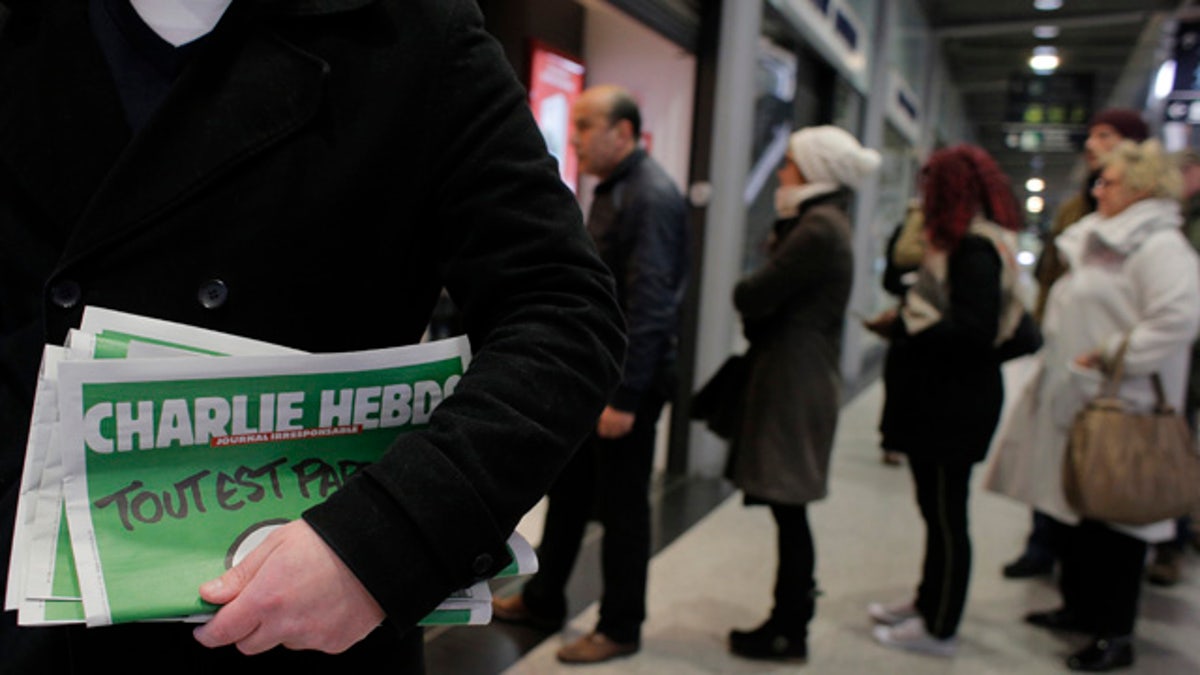
Jan. 14, 2015: A man leaves after buying Charlie Hebdo newspapers as people queue at a newsstand in Paris. (AP Photo/Christophe Ena)
The first issue of Charlie Hebdo to be produced since Islamist gunmen killed 12 people in an attack on the satirical magazine in Paris last week has been flying off the shelves at newsstands across the French capital Wednesday morning amid backlash from Islamic leaders who objected to the cover's depiction of the Prophet Muhammad.
Sky News reported that lines to buy the magazine began forming at 6 a.m. local time (midnight Eastern) and some newsstands had sold out by 8 a.m. The Associated Press reported that one newsstand just off Paris' Champs Elysee sold out at 6:05 a.m. -- five minutes after opening. At Saint-Lazare, people hoping to buy a copy scuffled when they realized there weren't enough to go around.
"It was incredible. I had a queue of 60-70 people waiting for me when I opened," one woman said. "I've never seen anything like it. All my 450 copies were sold out in 15 minutes."
The surge in sales has prompted the magazine’s distributor, MLP, to bring its print run up to five million copies -- two million more than planned -- according to its president Véronique Faujour, who spoke to AFP.
Sky News correspondent Robert Nisbet reported that one newsstand outside the Gare de l'Est railway station had 75 copies when it opened for business.
"They all went, they're waiting for more," he said. "You can't get a copy inside the Gare de l'Est railway station at all, such is the demand not just here, but all around the world."
Sky News and The Telegraph reported that some copies had already been listed on eBay, with one seller seeking 511 British pounds ($775).
The first 500,000 issues of an eventual 3 million print run were scheduled to go on sale Wednesday, with another 500,000 due to be produced tomorrow. A typical print run for the weekly is 60,000 issues.
"Distributing Charlie Hebdo, it warms my heart because we say to ourselves that he is still here, he's never left," Jean-Baptiste Saidi, a van driver delivering copies well before dawn on Wednesday, told the Associated Press.
Wednesday marked the one-week anniversary of the deadly terror attack at the magazine's offices by two brothers, Said and Cherif Kouachi, who claimed to be members of Al Qaeda. Twelve people were killed, including eight staffers, among them the magazine's editor and four staff cartoonists. The survivors, working out of offices borrowed from the left-wing daily Liberation, began production of Wednesday's issue two days after the murder of their colleagues.
"For the past week, Charlie, an atheist newspaper, has achieved more miracles than all the saints and prophets combined," the lead editorial in Wednesday's edition read. "The one we are most proud of is that you have in your hands the newspaper that we always made."
The issue will be printed in French and Italian, with online translations available in English, Spanish, and Arabic. Proceeds from the sales will go to aid the families of the victims.
Not everyone has greeted the new issue with acclaim. In particular, the cover cartoon depicting Muhammad holding a "Je Suis Charlie" sign and weeping drew condemnation from Muslim leaders around the world.
Al Azhar, the prestigious Cairo-based center of learning for Sunni Muslims said Tuesday that the drawings "do not serve the peaceful co-existence between peoples and hinders the integration of Muslims into European and Western societies."
The Washington Post, citing the SITE Intelligence Group, reported that extremist sympathizers had posted fresh calls for violence on social media, with one Twitter user saying "They want a car bomb this time."
On Wednesday, police detained the controversial comic Dieudonne for posts on Facebook that appeared to praise the attacks.
Dieudonne's detention for defending terrorism followed a four-year prison sentence involving the same charge for a man in northern France who seemed to defend the attacks in a drunken rant while resisting arrest.
Dieudonne, who popularized an arm gesture that resembles a Nazi salute and who has been convicted repeatedly of racism and anti-Semitism, is no stranger to controversy. His provocative performances were banned last year but he has a core following among many of France's disaffected young people.
His Facebook post, which was swiftly deleted, said he felt like "Charlie Coulibaly" -- merging the names of Charlie Hebdo and Amedy Coulibaly, the gunman who seized a kosher market and killed four hostages, along with a policewoman.
The Associated Press contributed to this report.
